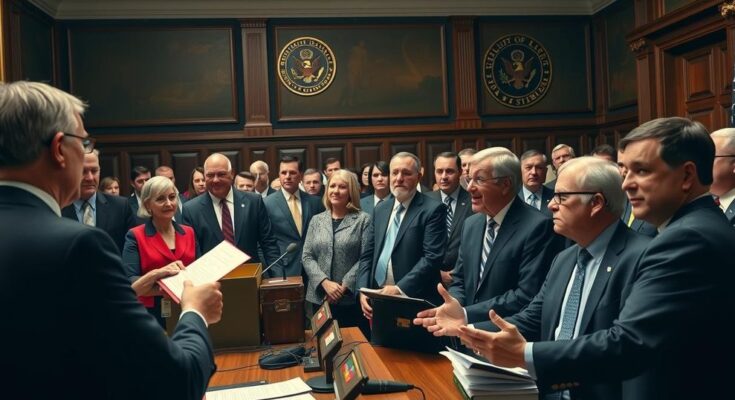As the U.S. general election approaches, Donald Trump and Republican leaders work to consolidate support among conservative Christians, focusing on values of life, family, and Israel. However, disagreements over unconditional support for Israel amid geopolitical conflict create tension within this voter base, with some expressing a desire for a more humanitarian and America First approach. As demographics evolve, the challenge for the Republicans lies in reconciling traditional support for Israel with emerging dissent among younger and more progressive evangelicals.
In the lead-up to the United States general election, former President Donald Trump and his allies have been energetically engaging with conservative Christians, aiming to solidify this essential voter base. Prominent events such as “Believers for Trump” and “Believers and Ballots” aim to reassure supporters amidst concerns regarding Trump’s personal morality, which have lingered since his initial presidential campaign in 2015. Republican leaders maintain that their party upholds conservative Christian values. Michael Whatley, Chair of the Republican National Committee (RNC), affirmed, “We are absolutely pro-life, we are pro-family, and we are pro-Israel,” during a rally in Austell, Georgia—a crucial battleground state populated by conservative Christians and evangelicals. Nonetheless, some attendees at this event voiced reservations about the party’s unwavering support for Israel, especially in light of the ongoing Middle Eastern conflicts that have resulted in significant Palestinian casualties. Cindye Coates, a conservative Christian pastor, expressed a sentiment that challenges the party’s rhetoric: “I’m pro-life, pro-family and pro-humanity,” emphasizing a more holistic approach to political priorities. Attending the event, Coates and her husband pointed out the contradictions inherent in continued military aid to Israel while advocating an “America First” agenda. As discussions about the Republican stance on Israel grow among conservative grassroots, polls reveal a complex relationship: while a majority of evangelical Christians support Israel, there is also a noticeable subset advocating for restrictions on aid. A Pew Research poll indicates Trump holds a strong majority among white evangelical voters, underscoring their importance in swing states like Georgia, where demographic shifts can decisively influence electoral outcomes. White evangelicals constitute a leading demographic in Georgia, making their perspective crucial to understanding broader political patterns. Despite the overwhelming support for Israel among this group, there is evidence of dissent regarding the unconditional backing of its government, with younger Republicans increasingly questioning such policies—a phenomenon highlighted by anecdotal evidence from voters expressing skepticism about financial aid directed towards foreign conflicts. As the electoral campaign progresses, Trump’s narrative presents him as a defender of Israel, showcasing his administration’s actions like the transfer of the U.S. embassy to Jerusalem, which aligned with certain evangelical prophecies. The RNC continues to capitalize on this narrative, urging voters to regard alignment with Israel as a moral imperative. Ralph Reed, president of the Faith and Freedom Coalition, emphasized this during the rally, framing support for Israel as essential to garnering divine favor for the nation. However, opinions vary significantly among evangelical leaders. Some contend that integration of political support for Israel runs counter to their spiritual beliefs, while others firmly align their biblical interpretation with unwavering support for the Israeli state. This divergence illustrates the complexity of beliefs among evangelicals concerning both political engagement and international relations. Ultimately, the discord stemming from Trump’s foreign policy commitments, particularly concerning Israel, poses a challenge for the Republican Party as it seeks to unify its diverse voter base. The upcoming election thus represents not only a test of Trump’s enduring appeal among conservative Christians but also an opportunity for a re-evaluation of the party’s stance on key international issues.
The article delves into the intersection of conservative Christianity and political engagement in the U.S., particularly in the context of the upcoming general election. It highlights the significant role that evangelical voters play in shaping electoral outcomes, especially within critical battleground states like Georgia. The narrative explores how Trump’s turbulent history has affected his relationship with conservative Christians and underscores the complex dynamics surrounding the party’s support for Israel amidst ongoing geopolitical conflicts. The diverse opinions within the evangelical community regarding foreign aid and the support for Israel illustrate a significant ideological shift that could impact Republican strategies and policies moving forward.
The article elucidates the multifaceted relationship between conservative Christians and the Republican Party as the election approaches. Despite Trump’s strong support among evangelical voters, growing dissent regarding unconditional support for Israel and foreign aid reflects a potential shift in attitudes that could reshape the party’s electoral strategy. Engaging with these concerns while maintaining a unified voter base will be essential for the Republicans as they seek to leverage their relationships with conservative Christians in the upcoming election.
Original Source: www.aljazeera.com




